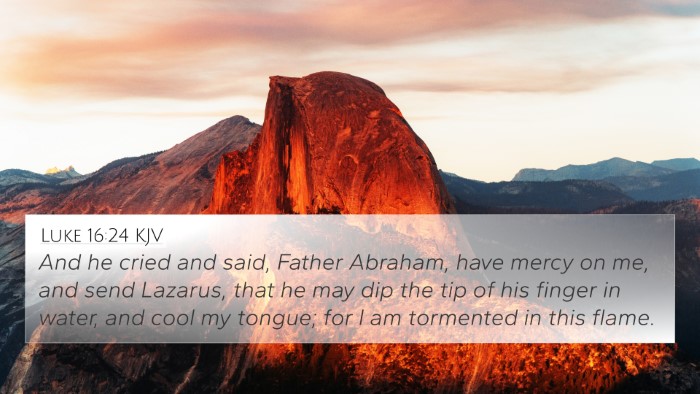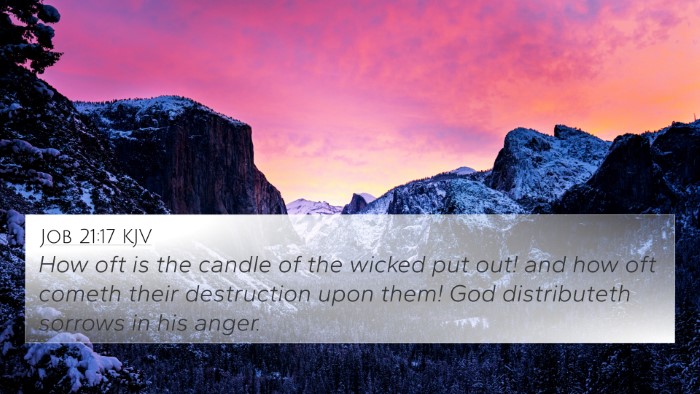Bible Verse Meaning: Matthew 25:8
Matthew 25:8 states, "And the foolish said unto the wise, Give us of your oil; for our lamps are gone out." This verse occurs within the Parable of the Ten Virgins, where Jesus teaches about preparedness and the importance of spiritual readiness.
Summary of the Verse
In this verse, the foolish virgins acknowledge their lack of oil, representing a lack of spiritual preparedness. They turn to the wise virgins for help, signifying a desperate search for assistance at a crucial moment. This situation illustrates the importance of individual responsibility in one's spiritual life.
Public Domain Commentary Insights
Matthew Henry's Commentary
Matthew Henry emphasizes the contrast between the wise and foolish virgins. He explains that the oil symbolizes the grace and Holy Spirit necessary for spiritual enlightenment. The request from the foolish virgins highlights their unpreparedness, showing that such vital spiritual provisions cannot be borrowed from others when the time comes for accountability.
Albert Barnes' Notes
Albert Barnes notes that the oil represents genuine faith and good works. The foolish virgins’ plea signifies the urgency of their situation, which reflects a common human tendency to seek help only in times of crisis rather than cultivating one's faith beforehand. This highlights the necessity of being proactive in one’s spiritual journey.
Adam Clarke's Commentary
Adam Clarke elaborates on the symbolism of the lamps and the oil, linking them to the light of faith. He points out that the foolish virgins represent those who neglect spiritual vigilance and do not prepare for the challenges that arise. Clarke stresses the lesson on self-reliance when it comes to spiritual matters.
Bible Verse Cross-References
- Proverbs 21:20: "There is treasure to be desired and oil in the dwelling of the wise; but a foolish man spendeth it up." This connects the value of wisdom in spiritual preparedness.
- Matthew 24:44: "Therefore be ye also ready: for in such an hour as ye think not the Son of man cometh." Relates to the theme of readiness for Christ's return.
- 1 Thessalonians 5:2-3: "For yourselves know perfectly that the day of the Lord so cometh as a thief in the night." This reinforces the concept of being vigilant and prepared.
- Revelation 3:15-16: "I know thy works, that thou art neither cold nor hot: I would thou wert cold or hot." Similar to the consequences of being lukewarm in faith.
- Lamentations 3:25: "The Lord is good unto them that wait for him, to the soul that seeketh him." Emphasizes the positive outcome of waiting and being prepared.
- Luke 21:36: "Watch ye therefore, and pray always, that ye may be accounted worthy to escape all these things that shall come to pass." Related to the preparedness theme in Matthew 25:8.
- James 2:17: "Even so faith, if it hath not works, is dead, being alone." This links the necessity of action in faith with the need for oil (sustaining grace).
Thematic Connections
Matthew 25:8 resonates with several themes found throughout Scripture, emphasizing the importance of:
- Preparedness: Being spiritually ready for the return of Christ.
- Personal Responsibility: Each person is accountable for their spiritual state.
- Self-sufficiency in Faith: One cannot rely solely on others for spiritual sustenance.
Cross-Referencing Biblical Texts
Understanding Matthew 25:8 through the lens of its cross-references helps to deepen our insight into the necessity of vigilance in faith. It illustrates how the connections between Bible verses enhance our grasp of theological themes.
Why Cross-Referencing is Valuable
Using tools for Bible cross-referencing can illuminate connections between Old and New Testament teachings, revealing a cohesive narrative throughout the Scriptures. Engaging in cross-reference Bible study allows believers to:
- Gain a comprehensive understanding of Biblical themes.
- Identify similarities and differences in teachings across different biblical contexts.
- Enhance sermon preparation and personal study.
Conclusion
Matthew 25:8 serves as a poignant reminder of the importance of spiritual readiness. Through its analysis and the insights gained from various public domain commentaries, we can appreciate the depth of its meaning as it aligns with the broader biblical narrative. By exploring inter-Biblical dialogue and cross-referencing themes, believers are equipped to navigate their spiritual journeys with greater awareness and preparedness.
















